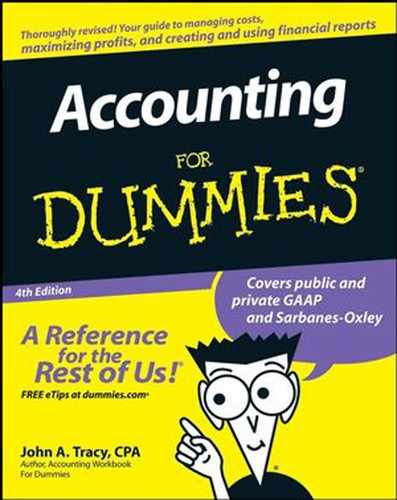12.1. Recognizing Management's Role
Whether a business is a small private company or a large public corporation, its annual financial report consists of
The three basic financial statements: income statement, balance sheet, and statement of cash flows.
A statement of changes in owners' equity (if needed). Although it's called a "statement," this item is more properly described as a supplementary schedule. It reports certain information regarding changes in owners' equity accounts during the year that is not included in its three primary financial statements. (See "Statement of Changes in Owners' Equity" later in the chapter.)
And more.
In deciding what "more" means, the business's CEO and top lieutenants play an essential role — which they (and outside investors and lenders) should understand. The CEO does certain critical things before a financial report is released to the outside world:
Confers with the company's chief financial officer and controller (chief accountant) to make sure that the latest accounting and financial reporting standards and requirements have been applied in its financial report. (The president of a smaller private company may have to consult with a CPA on these matters.) In recent years, we've seen a high degree of flux in accounting and financial reporting standards and requirements. The private sector Financial Accounting Standards Board (FASB) and the governmental regulatory agency, the Securities and Exchange Commission (SEC), have been very busy in recent years — to say nothing of the federal Sarbanes-Oxley Act of 2002 and the creation of the Public Company Accounting Oversight Board.
NOTE
A business and its auditors cannot simply assume that the accounting methods and financial reporting practices that have been used for many years are still correct and adequate. A business must check carefully whether it is in full compliance with current accounting standards and financial reporting requirements.
Carefully reviews the disclosures in the financial report. The CEO and financial officers of the business must make sure that the disclosures — all information other than the financial statements — are adequate according to financial reporting standards, and that all the disclosure elements are truthful but, at the same time, not damaging to the business.
Considers whether the financial statement numbers need touching up. The idea here is to smooth the jagged edges off the company's year-to-year profit gyrations or to improve the business's short-term solvency picture. Although this can be described as putting your thumb on the scale, you can also argue that sometimes the scale is a little out of balance to begin with and the CEO should approve adjusting the financial statements in order to make them jibe better with the normal circumstances of the business.
|

